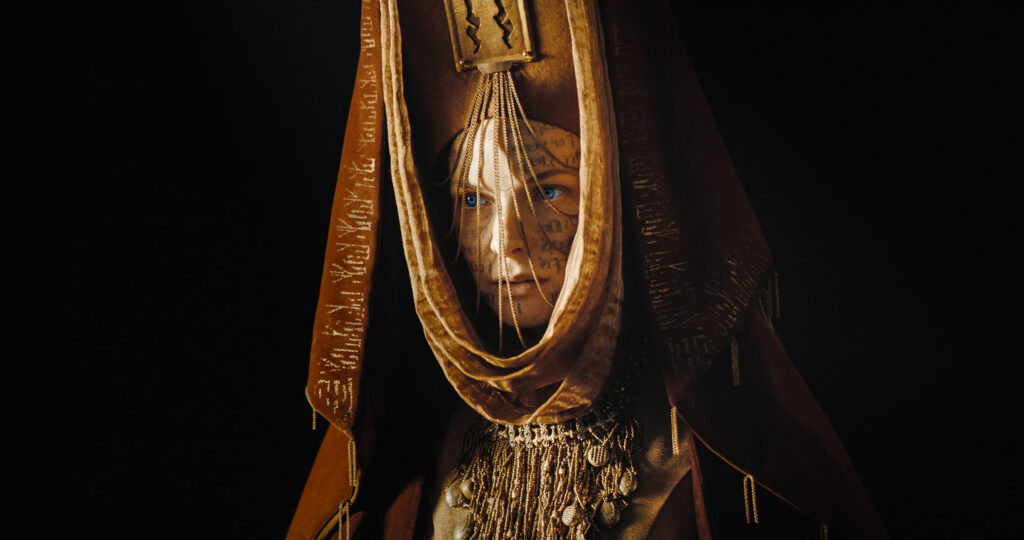‘Dune: Part Two,’ an Epic of Faith, Is a Genesis for the Space Age
It is not too early to crown the sci-fi sensation, taut and triumphant, as the year’s best movie.

“Dune: Part Two” is, despite its run time of nearly three hours, a taut tale, written in sand and blood, of the power of faith. It improves in every way on its stellar predecessor and gives new life to Frank Herbert’s book, one of science fiction’s tentpole tomes. Its setting and its subject is the desert, and the kind of hallucinations and hopes that can bloom where nothing else lives. It is not too early to crown “Dune” as the year’s best movie.
Directed by Denis Villeneuve, “Dune” picks up where its predecessor left off, set in a future that resembles a cross between “Star Wars” and “Game of Thrones.” The planet of Arrakis, the only place in the galaxy where an extraordinarily lucrative substance known as “the spice” — it makes deep space travel possible — can be harvested, has become a war zone after House Harkannen, whose genetics apparently predispose its members to resemble human moles, murder the planet’s rightful governors, House Atreides.
Surviving the season of slaughter, though, is the Atreides heir, Paul Atreides (Timothée Chalamet), and his mother, Lady Jessica, played by Rebecca Ferguson. While the repulsive Baron Vladimir Harkannen (Stellan John Skarsgård) builds a dark city under Arrakis’s blinding sun, Paul and his mother embed themselves in the desert hinterland with the Fremen, a people native to the seas of sand. Word is whispered that Paul is more than just a refugee.
The long-suffering Fremen begin to see Paul, who takes on the name Muad’dib, as a messianic figure. They wonder if he could be what their scriptures tell them is the Lisan al Gaib, “The Voice from the Outer World.” The fervor only ratchets up after a string of guerrilla victories. Paul, too, commandeers a giant sand worm, proving he is not only the son of a duke but also an offspring of the desert. He is haunted, though, by dreams of horror.

Skeptical of this talk of signs and wonders is a Fremen woman, Chani (the now-ubiquitous Zendaya), who falls in love with Paul but not his burgeoning myth among her people. Hard-nosed and practical, Chani wants liberty but not salvation. The passion between Paul and Chani is rewardingly marbled with stubborn disapproval, frustration, and pleasingly yielding resistance. She is his first love and his most recalcitrant heretic.
The deep bass of Hans Zimmer’s score sounds in the bones, and a glorious addition is the character of Feyd-Rautha Harkonnen, played with psychotic charisma by Austin Butler, who did, after all, inhabit Elvis for a spell. In a show-stopping, black-and-white scene reminiscent of Leni Riefenstahl’s “Triumph of the Will” crossed with Ridley Scott’s “Gladiator,” Feyd-Rautha proves himself before his uncle with a spectacle of bloodletting.
Mr. Villeneuve, the auteur behind such accomplished visions as “Sicario,” “Arrival,” and “Blade Runner 2049,” has an eye for the quiet moments that convey a world. A scream sounds, a door opens on Baron Harkonnen, and two lifeless women rest against the wall, as if they were taking a break from posing for Botticelli. Paul and Chani slide through the sand, their steps a salsa dance meant to avoid rousing the worms. Degraded lips caress a gleaming shoe.

Paul’s efforts to evade his destiny are as successful as Moses’s and Jonah’s before him. He goes south, to the Fremen fundamentalist heartland, and there the lore of Muad’dib begins. The old ways bend the knee, and with the aid of a magic potion extracted from a worm — the Fremen call these beasts Shai-Hulud and worship them as avatars of the divine — Paul becomes the messiah his water-hoarding adopted people have thirsted after for generations.
While the battle scenes of “Dune” are spectacular and its visuals ravishing, the movie’s intelligence is drawn to belief’s ballast. Paul’s rise is a cynical feat of engineering, a Dorian Gray-esque tale of corruption, the manipulation of the potent yearnings of a downtrodden tribe. Think Shabbetai Tzvi transposed from the shtetl to the outer reaches of the star system. A Fremen elder, Silgar (Javier Bardem), is a vividly drawn portrait of homespun fanaticism.
“Dune” also takes faith seriously, a rarity at Hollywood, where pilgrimage usually means a trip to a studio lot and a prayer is a hope for a turn as an extra. A yearning for salvation drives the plot, and the manipulation of miracles does not, the film insists, mean that they are less real. To reach toward apocalypse will mean enormous suffering for all involved, and by the film’s end, Paul’s choices are already fateful. The script, though, is not always ours to write.

